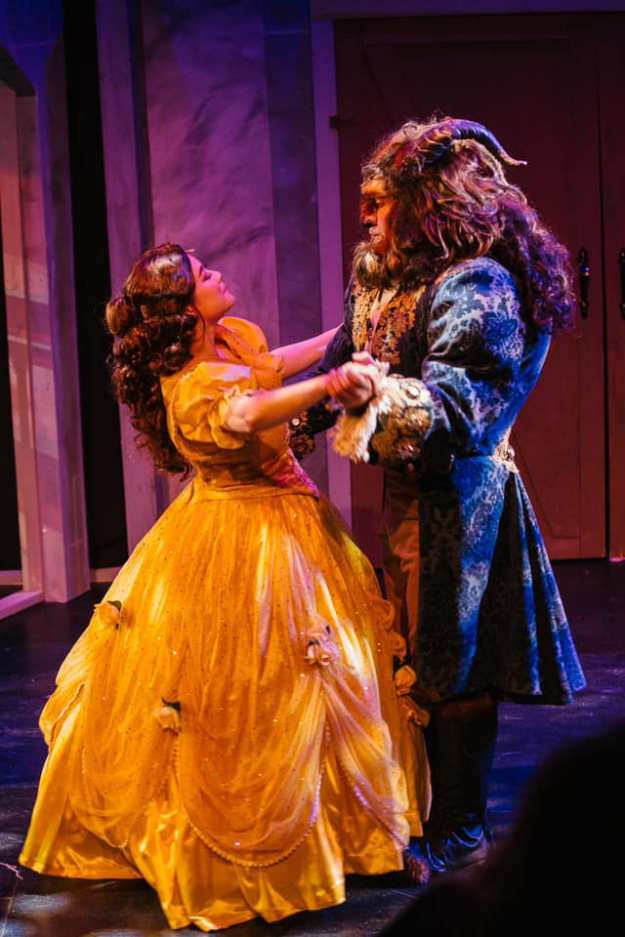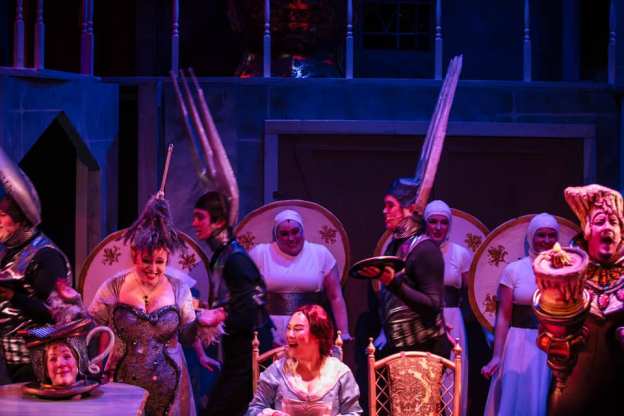Karen Schenk of Iconium Media captures the delightful “Be Our Guest!” Jenn Bewick as Chip, Rachel Love Haverkamp as Babette, Ruth Wong-Miller as Belle, Trevor Warden as Lumiere, and ensemble members.
Since 2015, Foote in the Door Productions has brought eight musical theatre mainstage productions to Edmonton audiences, and I’ve seen all of them. All of them have been previously unfamiliar to me (except for Little Women for which I knew the L.M. Alcott source novel) and I’ve appreciated the chance to discover new music and stories, from the pointed satire about 1960s office politics How To Succeed in Business…Without Really Trying, and the disturbing tragedy of Carousel, to the silliness of Dirty Rotten Scoundrels and the sweetness of A Little Night Music. The current offering from this company, playing at the Westbury Theatre until November 17th, is Disney’s Beauty and the Beast.
I had never seen this musical either. And I never saw the 1991 animated version in the cinema, since at the time I was a grad student without children in my life and not a fan of the Disney retellings of fairy tales. Also, this particular fairy tale has bothered me since I was a young new reader, unable to resist words on the page but terrified by the illustrations of a part-human, part-predatory monster. My parents suggested a compromise – they would lock the dangerous book in the glass-fronted oak bookcase in the living room, and I could ask for it to be unlocked for me when I thought I was ready. In the mid-1990s, though, some children I was getting to know showed me their family’s collection of the large white boxes of Disney VHS tapes, and one night I agreed to watch Beauty and the Beast with them. And I liked it in spite of myself! I loved the heroine – a book-loving loner! – loved the contrast between vain handsome Gaston and the more emotionally mature Beast, and was entertained by the animated objects of the Beast’s household. But I think I only watched it the once.
So I probably had less idea what to expect than most of the opening-night audience, even the children. There was a complicated two-level set (Leland Stelck), and a large musical ensemble filling one wing of the castle (Alyssa Paterson, musical director). A cast of twenty-five populates a large ensemble of villagers surrounding Belle (Ruth Wong-Miller), who escapes into books and dreams of a less “provincial” life, and her inventor father Maurice (Brian Ault). And the castle is home to the Beast (Russ Farmer) and his staff of enchanted objects (most memorably Trevor Worden’s candelabra Lumière). Thanks to Adam Kuss’s direction and the clever design of costumes (Betty Kolodziej), lighting (Bailey Ferchoff) and set, I rarely got an extended look at the Beast’s face in good light. This was consistent with the character’s self-loathing and shame, but it also made him as frightening as each audience member could imagine, neither unbearable nor ridiculous.

Ruth Wong-Miller as Belle, Russ Farmer as Beast. Photo by Karen Schenk of Iconium Media.
Belle’s change of heart towards her captor is shown as happening gradually, due to his actions, her fair-mindedness, and their growing shared interests, rather than some creepy Stockholm-syndrome impulse. Wong-Miller and Farmer both have strong voices that suit the music, and the iconic happy ending with the waltz in yellow ball-gown and brocade frock-coat is lovely.
Also of particular note are the video projections telling of encounters in the forest, almost like shadow-plays, by Jess Poole.
Next weekend’s matinees are already sold out – tickets for the remaining four performances are available through fringetheatre.ca or eventbrite.ca.










